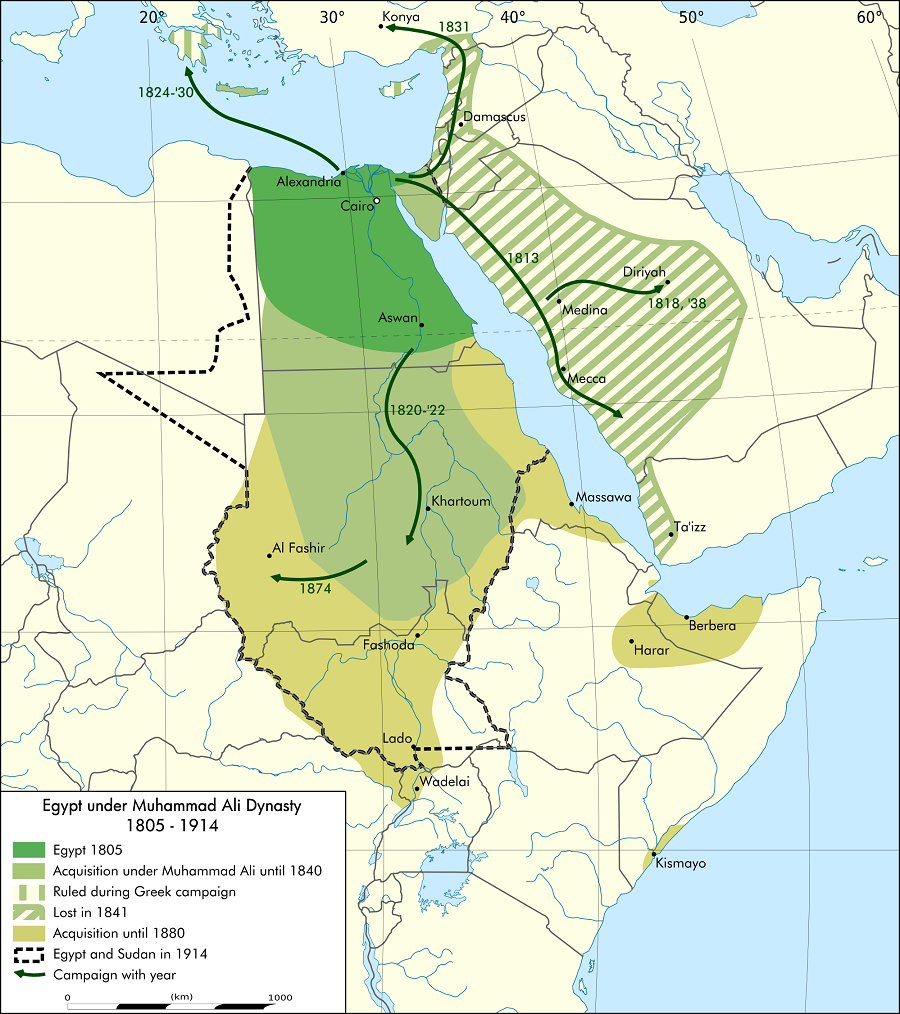Today’s installment concludes Great Britain Expands Control of Egypt,
our selection from History of England by James Franck Bright published in 1893.
If you have journeyed through all of the installments of this series, just one more to go and you will have completed a selection from the great works of seven thousand words. Congratulations! For works benefiting from the latest research see the “More information” section at the bottom of these pages.
Previously in Great Britain Expands Control of Egypt.

The fall of Khartum sealed the fate of the Sudan. The troops gradually fell back. A vigorous but not very successful attempt was made to reopen the line between Suakim and Berber, with all the most complete apparatus, such as a railway and vast pumps for supplying water to the troops. The expedition met with no disaster but encountered opposition of unexpected strength; and as the Indian troops employed were required elsewhere, the operation was given up, the railway apparatus sent back to England, the withdrawal from the Sudan concluded, and Wady Haifa made the extreme limit of the Egyptian frontier. The chances of invasion from the Mahdi still remained so strong, however, that an army of not fewer than fourteen thousand men was left in the country.
In spite of all this terrible blundering —- indeed, in some degree on account of it —- the condition of Egypt was extraordinarily improved before the dissolution of Parliament and change of Ministry in 1885. The Convention of London (April, 1885) may be regarded as the starting-point of the successful renovation of the country. From the first it had been recognized that finance lay at the bottom of the Egyptian question. The law of liquidation of 1880 had certainly been a long step forward; but it had in it one point of weakness, an error which has been common in many financial arrangements. It had insisted, not only on the payment of the interest of the debts, but on the establishment of a sinking- fund. Thus, when the resources set apart for the payment of the debt and therefore payable to the caisse were larger than was necessary, as they often were, to meet the interest of the debt, the surplus was paid into the sinking-fund, however much it might be needed for the general administrative expenses of the country. The bondholders benefited, but the Administration was starved. Sir Edgar Vincent had shown much ability, tact, and determination in bringing the finances into order and insisting on the practice of economy. But though by means of the sinking-fund the body of the debt had been diminished by a million, there was still an unpayable deficit on the administrative budget. Immediate improvement in the financial situation had been rendered hope less by the insurrection, the claims arising from the riots in Alexandria, and the difficulties in the Sudan. It was so plain that the deficit could only be extinguished by some change in the law of liquidation (which could not be modified without the consent of the great Powers) that Lord Granville assembled a conference in London to attempt a solution of the difficulty.
The conference was rendered futile by the unwillingness of France to allow any diminution of the interest paid to bond holders. But it had not been wholly useless. Plans had been suggested which might be used as a basis of future negotiations. Meanwhile, as the conference had settled nothing, Lord Northbrook was sent to Egypt as High Commissioner to see whether anything could be done on the spot. He advised the Egyptian Government to take a strong step, and to order the taxes to be paid direct into the exchequer instead of into the caisse, an evident violation of the existing regulations. Indeed, acting in behalf of their Governments, the Consuls- General of all the great Powers, with the exception of Italy, protested in no measured terms against the action of the Egyptian Government. The caisse went further and obtained a legal judgment against it. But meanwhile the broken negotiations had been resumed. The impossibility that Egypt should under the existing arrangements continue its course of improvement was demonstrated, and, with much expenditure of diplomacy and much timely concession, the English Government at length succeeded in securing a general consensus among the Powers, which was thrown into the form of the Convention of London. By this arrangement Egypt was allowed to raise upon the joint guarantee of all the Powers a loan of nine million pounds, at a low rate of interest; while for the future the surplus of the funds of the caisse, after paying the interest of the loans, was to be employed first in defraying any deficit in the administrative budget caused by duly authorized expenditure. If there was still a surplus, one-half went to the caisse, the other half the Administration was free to spend. The convention gave the required relief. The loan was raised with out the slightest difficulty. It enabled the Egyptian Government to pay the Alexandria compensations and all the outstanding deficits, and left in hand one million pounds to be spent on the most pressing need, the restoration of the system of irrigation.
With limits restricted to territory which it was within its power to defend, with finances which, now that the convention had secured a breathing-time, were sufficient for its needs, Egypt was henceforward to advance rapidly toward prosperity under the masterly leading of Major Evelyn Baring, subsequently Lord Cromer. The period of vacillation seemed to have reached its conclusion. Some of the magnificent hopes which had been formed in the earlier days of the occupation were laid aside, and a firm hand directed to complete a sufficient, if more restricted, program of reform.
The foreign policy of the Government had thus been attended with a fair measure of success in Europe, and, in spite of grievous blunders and disasters, had left Egypt in a more hopeful situation than that country had ever yet attained. It had produced peace; it had maintained and employed successfully the European con cert. Even when breaking with it and acting upon its own initiative, England had been allowed without any overt opposition to follow its own course.
| <—Previous | Master List |
This ends our series of passages on Great Britain Expands Control of Egypt by James Franck Bright from his book History of England published in 1893. This blog features short and lengthy pieces on all aspects of our shared past. Here are selections from the great historians who may be forgotten (and whose work have fallen into public domain) as well as links to the most up-to-date developments in the field of history and of course, original material from yours truly, Jack Le Moine. – A little bit of everything historical is here.
More information on Great Britain Expands Control of Egypt here and here and below.
|
We want to take this site to the next level but we need money to do that. Please contribute directly by signing up at https://www.patreon.com/history

Like!! Great article post.Really thank you! Really Cool.